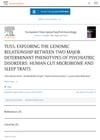 1 citations,
December 2022 in “Parasitologists United Journal”
1 citations,
December 2022 in “Parasitologists United Journal” House fly larvae substances improve wound healing and skin regeneration, especially in immunosuppressed mice.
 July 2019 in “bioRxiv (Cold Spring Harbor Laboratory)”
July 2019 in “bioRxiv (Cold Spring Harbor Laboratory)” Kashmiri women with PCOS have more Bifidobacterium in their gut.
 4 citations,
July 2019 in “Children (Basel)”
4 citations,
July 2019 in “Children (Basel)” The review concludes that more research is needed to better improve the health outcomes for people with Polycystic Ovarian Syndrome.
 7 citations,
November 2020 in “Experimental Dermatology”
7 citations,
November 2020 in “Experimental Dermatology” Different cell types work together to repair skin, and targeting them may improve healing and reduce scarring.
 12 citations,
May 2017 in “Pharmacology & therapeutics”
12 citations,
May 2017 in “Pharmacology & therapeutics” Targeting immune tolerance issues in Alopecia Areata could restore hair growth and maintain remission.
48 citations,
May 2018 in “Expert Opinion on Therapeutic Targets” Gut health may influence Alopecia Areata, suggesting new treatments.
 137 citations,
April 2015 in “Nature Reviews Molecular Cell Biology”
137 citations,
April 2015 in “Nature Reviews Molecular Cell Biology” Different types of stem cells with unique roles exist in blood, skin, and intestines, and this variety is important for tissue repair.
August 2024 in “Pharmaceuticals” Oral sturgeon oil promotes hair growth and improves gut health.
Lactobacillus and fermented Korean berry can help hair grow faster.
December 2022 in “Frontiers in Microbiology” The scalp microbiome is more diverse and may be more important in hair loss than the gut microbiome.
 16 citations,
January 2021 in “Dermatology and therapy”
16 citations,
January 2021 in “Dermatology and therapy” An imbalance in gut bacteria is linked to skin immune diseases and may affect their outcomes and related health issues.
 April 2023 in “Journal of Investigative Dermatology”
April 2023 in “Journal of Investigative Dermatology” Taking nicotinic acid supplements might help with acne by affecting the skin's oil glands, but high doses are needed.
April 2019 in “The journal of investigative dermatology/Journal of investigative dermatology” A compromised gut may trigger the autoimmune hair loss condition Alopecia Areata.
April 2019 in “Journal of Investigative Dermatology” Alopecia Areata patients have too many Firmicutes and too few Bacteroides in their gut.
 105 citations,
February 2017 in “British Journal of Dermatology”
105 citations,
February 2017 in “British Journal of Dermatology” Survivors of Stevens-Johnson syndrome/toxic epidermal necrolysis need ongoing care for various long-term health problems.
 2 citations,
May 2022 in “Cosmetics”
2 citations,
May 2022 in “Cosmetics” Further research is needed to understand how the microbiome affects hair loss in Alopecia Areata.
5 citations,
September 2022 in “Frontiers in Nutrition” Gut bacteria differences may help diagnose and treat Alopecia areata.
December 2018 in “International journal of women’s dermatology” Differences in skin and gut bacteria may contribute to alopecia areata.
 September 2021 in “bioRxiv (Cold Spring Harbor Laboratory)”
September 2021 in “bioRxiv (Cold Spring Harbor Laboratory)” Special gut cells help stem cells move to and fix injured areas by activating a specific signaling pathway.
1 citations,
November 2016 in “Frontiers in neurology” Steroid treatment improved both gut and nerve symptoms in a man with Cronkhite–Canada syndrome.
 September 2021 in “European Neuropsychopharmacology”
September 2021 in “European Neuropsychopharmacology” The research explores how gut bacteria and sleep patterns are related in mental health disorders.
 January 2023 in “Discovery immunology”
January 2023 in “Discovery immunology” T cells and bacteria in the gut and skin help maintain health and protect against disease.
 6 citations,
January 2021 in “Frontiers in Immunology”
6 citations,
January 2021 in “Frontiers in Immunology” Certain immune cells worsen post-surgery gut paralysis by activating a specific immune response.
181 citations,
December 2017 in “Trends in immunology” Intestinal intraepithelial lymphocytes are crucial for gut immunity and maintaining the mucosal barrier.
 16 citations,
May 2013 in “Australasian Journal of Dermatology”
16 citations,
May 2013 in “Australasian Journal of Dermatology” Hair loss in Cronkhite-Canada syndrome is reversible by treating the gut issues and doesn't need steroid treatment for the hair itself.
 20 citations,
February 2013 in “Nutrition”
20 citations,
February 2013 in “Nutrition” Selenium-enriched green tea might be a safe prebiotic for gut health.
November 2019 in “European journal of internal medicine” A Laotian man with unusual skin changes and multiple growths in his gut was diagnosed with Cronkhite-Canada Syndrome and improved with nutritional and immune-based treatments.
 39 citations,
October 2013 in “Plastic and Reconstructive Surgery”
39 citations,
October 2013 in “Plastic and Reconstructive Surgery” Human alpha defensin 5 helps heal wounds, reduce bacteria, and grow hair on burned skin.

A functional medicine approach may help long COVID patients by focusing on adrenal fatigue, gut health, and vitamin D deficiency, using diagnostic tools and lifestyle changes.
1 citations,
August 2022 in “Frontiers in Physiology” Finasteride may help treat kidney disease caused by a high-fat diet by reducing harmful toxins and improving gut bacteria.


















